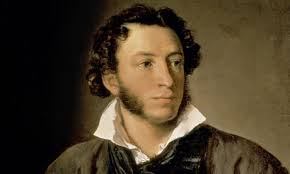|
Alexander Pushkin was born June 6, 1799 in Moscow, Russia to a family of Russian nobility. His great-grandfather on his mother’s side-Abram Gannibal- was brought from Africa as a slave and rose to become an aristocrat. At the age of fifteen Pushkin published his first poem, and upon graduating from grade school he gained notoriety for his literary talents. His graduating class was the first graduating class of the Imperial Lyceum in Tsarskoe Selo. In 1820 he published his first long poem titled Ruslan and Lyudmila a poem that sparked much controversy. He became a mainstay within the literary scene of St. Petersburg, Russia; his stance on social reform made him an opponent of the Russian Government. In 1820 he was transferred from St. Petersburg to the Caucasus, then to Crimea, then Kamenka, and Chisinau, while in Chisinau he committed himself to freemasonry. Pushkin aligned himself with a secret organization called Filiki Eteria; the group was created to overthrow the Ottoman rule of Greece. When war was waged against the Ottomans, Pushkin kept a diary of the events. Pushkin left Chisinau in 1823 but not before he wrote two romantic poems that brought him national acclaim. The two poems were titled, The Captive of the Caucasus and The Fountain of Bakhchisaray. In 1823 while in Odessa Pushkin was again exiled by the government until 1826, while in exile he wrote love poems to Elizaveta Vorontsova the wife of the General-Governor. Pushkin was given permission to visit Tsar Nicholas to petition for his release from exile, he gained his freedom but was under strict government control because of previous poems. He was not able to publish his poems unless he was given permission by the government. Pushkin also wrote his most famous play during exile, Boris Godunov but could not publish it until five years later because he was exiled. That play would not be staged until 2007. In 1828 Pushkin met a 16 year old beauty named Natalya Goncharova he offered her a marriage proposal in 1830, she accepted it under the condition that he would not get persecuted by the government. They were officially married on February 18, 1831. Pushkin would once again begin building a legendary reputation as a writer; he is considered the greatest Russian poet and the founder of modern Russian Literature. His most famous work of art is the verse novel Eugene Onegin; he composed other masterpieces such as The Bronze Horseman, The Stone Guest, Don Juan and Mozart and Salieri. Mozart and Salieri was the inspiration behind Peter Shaffer’s Amadeus. Pushkin also had an influence on the Russian operas; the composer Glinkas created the pieces Ruslan and Lyudmila because of Pushkin. Tchaikovsky created the opera Eugene Onegin after Pushkin’s verse novel; he also created the opera The Queen of Spades because of Pushkin. Other operas were influenced by Pushkin such as Boris Godunov, Rusalka, The Stone Guest, Mozart and Salieri, Tale of Tsar Saltan, The Golden Cockerel, Prisoner of the Caucasus and many more. Ballets, cantatas and songs were also created because of the literary works Pushkin created, he is also considered to be the central figure of Russian romantic literature. Pushkin’s writings combined all the contemporaneous elements needed to create Russian literature. Pushkin later created Russian magazine culture, and he also inspired the genre of Russian folk tales. Pushkin died in 1837 as a result of a fatal wound while dueling with the man accused of sleeping with his wife. Upon his death Pushkin managed to restructure and create new elements of Russian literature. His vision and his writing styles kept him in trouble with the Russian government but inspired a whole country and generations to come. Russian literature and literature across the world owes a debt of gratitude to Pushkin for his influence on writings, music and operas. Mr. Alexander Sergeyevich Pushkin; we stand on your shoulders. J.A. Ward. Click below to view Alexander Pushkin video
0 Comments
Leave a Reply. |
Details
Categories
All
Click Here to join our mailing list
|
Contact Us: |
Connect With Us |
Site powered by PIT Web Design


 RSS Feed
RSS Feed



